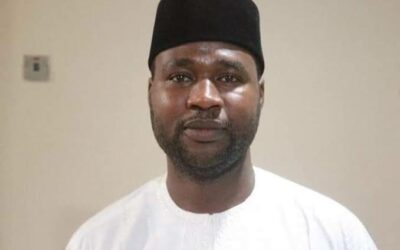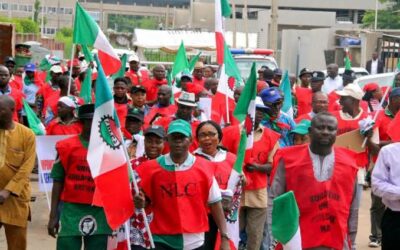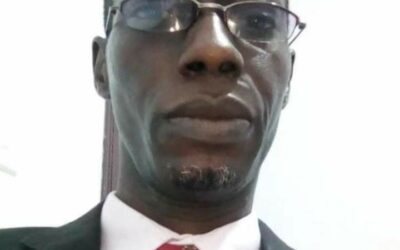Being Speech by Professor Wole Soyinka to the Delta State House of Assembly on the occasion of his Visit to the State during the 24th National Converge of the National Association of Seadogs, held in Warri between 23rd – 25th NOVEMBER, 2000.
Mr. Speaker, Honourable Members of the Delta House of Assembly,
Let me begin by conceding the fortunate timing of my presence here among you, in view of those events that appear to have galvanised the world these past days, provoking a mixture of astonishment, derision, and undoubtedly, in some quarters, perhaps some ammunition for future political opportunism. By that I mean that we must not not fail to recognise that there are some for whom the electoral melodrama in the United States of America provides, not merely malign satisfaction – as in some of us, to be quite candid – but a far more sinister extract, in short, a source of temptation. I can imagine the thoughts of such individuals going in the direction of – well, if ballot manipulation – plainly known as 'rigging' – is possible in that democratic holy of holies, let us see who is going to cry 'Wolf' when I next decide to make my own move – be it by ballot or by bullet. The world is full of madmen who see nothing in the discomfiture of the Global Democratic Watchdog but an invitation to bide their time, allow for a decent interval and then – pounce on any complacent electorate. And so, while we all enjoy our all too human bout of gloating, let us be on the alert. Even more importantly however, let us see what lessons we can learn from the democratic misadventure of Uncle Sam.
By another fortuitous circumstance, I recently participated in a conference – on the sixth of this same November, to be precise – on the theme of "Constitutionalism and Society in Africa" This conference took place at the State University of Ohio, in Athens, and my keynote address was delivered virtually on the eve of the now infamous American presidential elections. In the course of that address, I made the following remarks, which have since turned out to be rather prescient. I quote:
"The Americans sometimes think that they are the great teachers, the ultimate exemplars who have nothing to learn from the rest of the world. They are so wrapped up in a cocoon of sanctimoniousness that they remain blinded to what is so apparent to the rest of the world – the holes in their carapace of hypocrisy."
I did go on however to caution against the danger of stereotyping a whole nation, and so I amended my statement somewhat. Again I quote:
"Well, I wish to avoid the unfairness of generalisation, so I shall speak only of their elected leadership – I regret to say that they often strike me as school beginners, and retarded ones at that. If they were not so obsolete in their thinking, they would have learnt, not only from the outside world, but from their own electorate…"
It was necessary to make that distinction, since my observation, during several years of interraction with those frankly aggravating people, is that a huge gulf appears to separate the generality of the people from their lawmakers, and surely, this cannot be peculiar to the United States alone. I am a firm believer in the biblical injunction of minding the beam in one's own eyes before pointing out the mote in another's. And so,in the process of admonishing others to look inwards to their own shortcomings, we here must not fail to profit from their season of self-inflicted humiliation.
Of these lessons, the most relevant and obvious for us is that this crisis has already lasted nearly two weeks and, right till this moment, there have been no abnormal troop movements, no dark mutterings emanating from the American equivalent of our military beer-and-pepper-soup joints. No one has complained of an imminent breakdown of law and order. There has been no threat from any military source berating the politicians for any failure to 'get their act together and threatening to act to save the nation from imminent chaos etc. etc. ad nauseam. It is the regular judicial structure that is arbitrating this contest, not some rookie judge imported from the wilds of Arkansas to sit over the results in the U.S. equivalent of Abuja, preferably at dead of night. No fly-by-night mercenary Association for Better America has sprung up to act 'in the public interest', with of course the blessings and generous funding of President Clinton. In short, the existing structures are functioning within their civic, statutory competencies. Demonstrations there certainly are, but no be-goggled Chief of Army Staff has gone on the air to threaten the Governor of Florida that if he failed to curb those demonstrations within the next twenty-four hours, the military would know what to do. So, even in the middle of crowing over the democratic colossus whose feet of clay are now humiliatingly exposed, let us note certain crucial differences.And it is within that context that I now proceed to comment on certain curious aspects of the conduct of the contestants in the American scenario.
I must take your minds back to our own most recent democratic exercise. You will recall that we had quite a bit of controversy – to put it mildly – over the 1998 presidential elections, the result of which was contested by the allegedly losing candidate, Olu Falae. When Falae decided to go to court, many people, including committed democrats who had fought against and suffered under the rule of Sanni Abacha, counselled strongly against such a step. It could short-circuit the democratic process, they feared. It could provide the military an excuse to stage yet another coup d'etat. The opposition was quite divided – healthily so, I believe – over the wisdom of this move. My position was unambiguous: Olu Falae was morally and politically obliged to pursue his grievances into the law courts. And my reasons were quite straightforward. Elections are merely one stage, one feature of the democratic process. They are designed to provide the armature, even a foundation for democratic governance, but they are not the sum of democracy.
The rule of law is also part of the character of democracy, and the electoral process is bound by specific laws, the flouting of which may erode the very foundations of democracy. In short, if the democratic structure or foundation is propped up by illegalities, then democracy itself has foundered. Surely, this fact is obvious. Democracy itself demands to be stressed. Our civic responsibility is simply to ensure that the stressing does not result in fatal cracks, and that responsibility includes a preparedness to take on any opportunists who may wish to take advantage of the temporary fragility that comes from the incidence of stress. This civic responsibility, this state of preparedness does not belong to the masses alone; indeed, it must be spearheaded by the various arms of elected government, by trade unions, the civil service, by women's organisations, by workers and peasants alike, and student bodies. Once again, I must emphasize that all-important expression: a state of preparedness. This involves thinking, and planning ahead.
Now, let us spend just a little time on the American variant on our own familiar scenarios – there are so many aspects which recall passages from our entire democratic history, instructive parts from which we should not fail to profit.
{mospagebreak}
We must re-negotiate the conditions of our existence as a nation. It is the right, and the responsibility of each and every one of us to enunciate quite clearly the philosophy of existence that makes life and community meaningful and acceptable to us. Time and time again, I have reiterated my position: I have no wish to be part of a society that condones the relegation of our women to second-class status, or mutilates the human body for a social infraction, even of a criminal kind. I passionately repudiate all concepts of a theocratic order of society – be this Bhuddist, Hindu, Moslem, Christian or Judaic. My religion pronounces it anathema, and whose religion is it to tell me that his or hers is more beneficent to humanity than mine. The space of religion must be guaranteed by any intelligent society, but that space must not conflict with the rules of state. When I hear a politician say that the Bible, the Koran, the Sharia, the Ifa Book or the Torah is superior to a nation's constitution, I do not take issues with such a statement. I prefer to respond instead by saying, 'Absolutely. In your home, yes. In your religious schools, in your church, temple, mosque, shrine, at your religious celebrations, observances, in your personally ordered relationships, in your dietary habits, your modes of worship, modes of celebration of birth and death, of triumphs and disasters, in your propitiation of unseen forces and on and on and on – yes, but absolutely not in the protocols that bind you and me together in public acts, duties and responsibilities, in the educational arena and in systems of justice – those crucial protocols that make us all equal under one law. To refuse to accept this is to state, clearly, that we occupy different nation spaces.
I must seize every moment to reiterate yet again that the declaration of sovereign laws by a part of the nation means that a Sovereign National Conference that many pretend they do not want to hear about, has indeed been commenced, unilaterally, and by those very forces which publicly declare it unnecessary and secretly work to frustrate its actualisation. They are right of course. A National Conference is superfluous because they have already held theirs, in isolation, or with others of like minds. Well then, where does that leave the rest of us? Only with one option: to convoque an assembly of our own and commence our own internal dialogue that must lead, in essence, to the adoption of a set of protocols that binding on the participants, one that, wherever deemed appropriate, is as defiant of the present articles of association as are the unilateral decisions of those who commenced their independent revisions of our constitution. And just as the secessionists have moved boldly, in an act of contempt towards the rest, to implement the findings of their own unannounced Sovereign Assembly, we also must move to implement our own decisions, unilaterally, until the two or more sides come together and hold that comprehensive dialogue that has been openly advocated since the time of Ibrahim Babangida, a dialogue that we shall not cease to advocate even if the best constitution imaginable emerges from the experts that this present government has managed to bring together.
A constitution is the legitimate fruit of the roots of a national assemblage, not the other way round. And we have stated, over and over again, that a National Conference does not – repeat, does not – contradict the functions of the present legislatures and the various responsibilities of the state and federal governments, any more than a constitution would, if one were voted into being tomorrow by the legislative assemblies. The assemblies would not vote to terminate their existence or shorten their legitimate life-span – we know that. We do not seek it, and have never advocated it. But a National Conference would clarify the field of choices even for the unavoidably narrow collection of experts that are at work on the constitution. They will hear voices which – even in their undoubted breadth of experience – they have never heard. They will penetrate those insterstices of group interests, interactions, negotiations, frustrations, grievances, aspirations and resolves into which they could not in any other way be admitted, not even if they spent the next two years touring the entire nation and speaking to every rural or riverine community in the nation. They will receive an education of unsurpassed depth and breadth that will astonish them.
And so, more importantly, will all those who inhabit those interstices, those who, for the first time, will encounter one another face to face, and begin to understand the variations and similarities of their social existence. We are speaking here of an Assemblage that may last six months, a year, eighteen months, maybe less than all of these, but definitely an Assemblage of peoples who are not looking forward to the next election, not looking forward to squatting in one House committee or another or junket across the globe to see how other legislators are minding their own business, or voting indecent allowances for themselves, their relations, their servants, their motor-cars, garages, servants' quarters, telephones or kitchen sinks. We are speaking here of an assemblage, not of professional politicians – although of course they will not be excluded – but of the nationalities that make up this artificial nation, an assemblage of identified group interests, all committed citizens of one national space, come together to interrogate the history that brought them together in the first place, and map out a course that will guarantee a co-existence in a heightened understanding of one another.
Is this so difficult to apprehend? At our peril we fail to do so. What was taken away at the inception of this Nigerian space must be restored – the Voice and the Will of the autochthones of that space. Not the voice that is exercised in the houses of elected representatives to administer an increasingly fractured edifice founded on an in-cohesive beginning, one whose cracks widen every moment and destabilise all convictions of and will to unity – but one that re-examines and restructures that beginning. Therein lies the crucial difference, and the response to those who insist that the functions of the legislative houses remain identical to the purpose of a National Conference. This abuse of intelligence by those who parrot such fallacies is simply self-demeaning. And let me emphasize that the initiative for the convening of such a gathering belongs to all, and no one has the power to stop any group coming together to debate their future.
Honourable Members of this Assembly, your voices are yours to project, and your will is yours to protect. You are the equals of any other gathering of people's representatives in this nation and, under the system that we claim to operate, even the Centre is only first among equals. Your areas of competence and autonomy of decisions and association are clearly defined. They are, and must remain sacrosanct. Within those areas, you possess as much latitude and sovereignty as any other. If others claim more, then you have a right and a duty to those you represent to claim their equivalent. Do not let yourselves be diverted, do not let yourselves be seduced or placated, and absolutely, do not submit to any intimidation.
Wole Soyinka
23rd Nov. 2000



